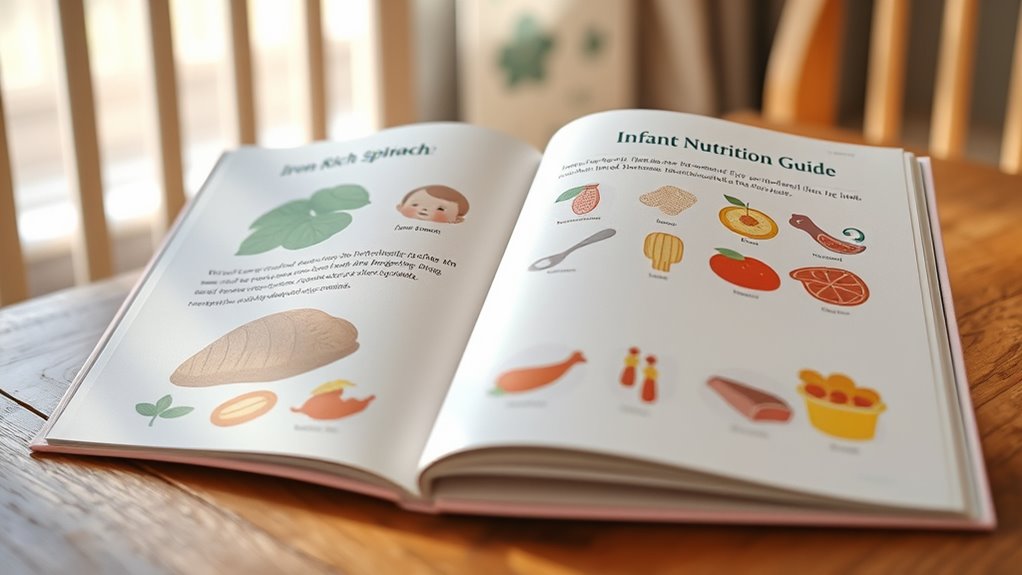You need to guarantee your infant gets enough iron for healthy growth, brain development, and immune support. Babies 6 to 12 months typically need about 11 mg daily, which can come from iron-rich foods like pureed meats, fortified cereals, beans, and greens. Introduce these gradually, and consider supplements if recommended by a pediatrician. Be careful with excess iron, as it can cause health issues. If you continue exploring, you’ll find how to meet your little one’s needs safely and effectively.
Key Takeaways
- Infants 6-12 months need about 11 mg of iron daily for healthy growth and brain development.
- Introduce iron-rich foods like pureed meats and fortified cereals around 6 months, paired with vitamin C for better absorption.
- Signs of iron deficiency include pallor, fatigue, and poor feeding; excess iron can cause stomach upset and organ damage.
- Use infant-specific iron supplements, such as liquid drops, under pediatric guidance to ensure proper dosing and safety.
- Regular medical consultation is essential to determine appropriate iron intake and prevent deficiency or overdose risks.
Understanding Your Infant’s Iron Requirements
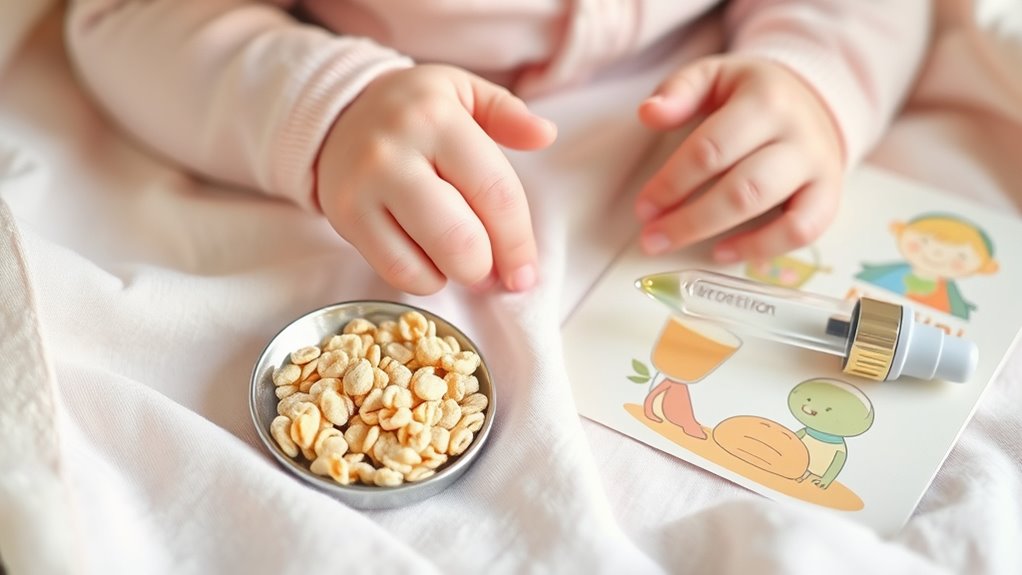
Understanding your infant’s iron requirements is essential for supporting healthy growth and development. During the first year, your baby’s iron needs increase as their blood volume expands and rapid growth occurs. Generally, infants aged 6 to 12 months need about 11 milligrams of iron daily. Breastfed babies may need additional iron sources after six months since breast milk alone might not meet their growing needs. Formula-fed infants usually get enough iron from fortified formulas. It’s important to monitor their intake because iron deficiency can lead to issues like fatigue, poor weight gain, and developmental delays. Ensuring your baby gets enough iron through diet or supplements helps support their energy levels, brain development, and overall health during this critical period. Adequate iron intake is especially important during this stage of rapid physical and cognitive development.
The Role of Iron in Infant Development
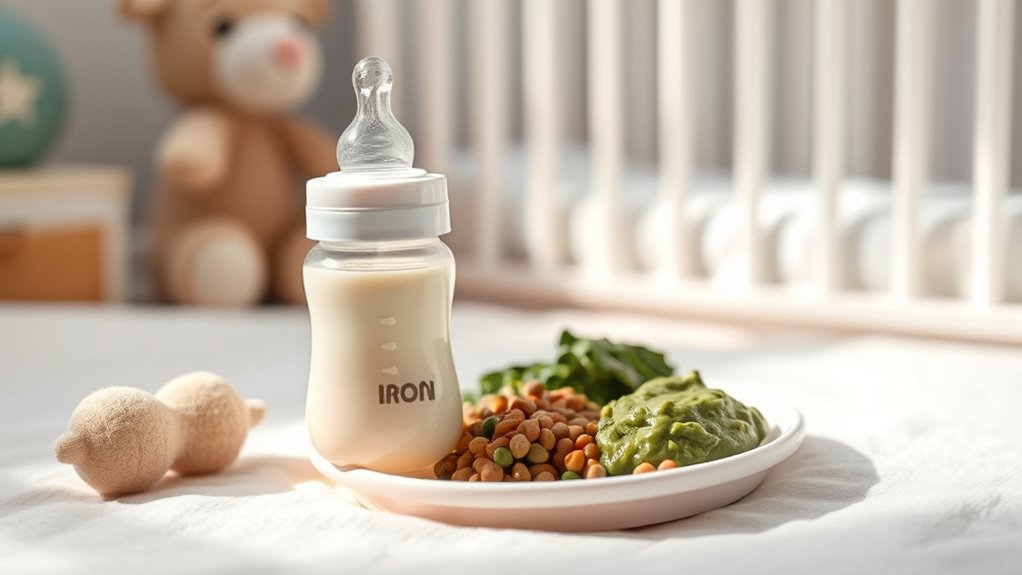
Iron plays a critical role in your infant’s development, particularly in supporting brain growth, motor skills, and immune function. It helps produce myelin, which protects nerve fibers and enhances communication between brain cells. Adequate iron levels also support overall cognitive development, helping your baby learn and explore their environment. Additionally, iron is essential for the formation of hemoglobin, allowing red blood cells to carry oxygen throughout the body—necessary for energy and physical activity. A sufficient iron supply strengthens your infant’s immune system, making it easier to fight off infections. Without enough iron, your baby might experience developmental delays, fatigue, or increased susceptibility to illness. Ensuring proper iron intake is fundamental to supporting your infant’s healthy growth and overall well-being. Lesser-known spots provide tranquil environments that can further support your baby’s outdoor exploration and development.
Recognizing Signs of Iron Deficiency in Babies

Since iron is essential for your baby’s growth and development, noticing early signs of deficiency can help you intervene before it affects their health. Watch for these warning signs:
- Pale skin and gums—your baby may look unusually pale, especially around the face and palms.
- Lack of energy and fussiness—they may seem constantly tired, irritable, or less interested in playing.
- Poor feeding or difficulty swallowing—a sudden disinterest in eating could signal iron issues.
- Changes in blood flow indicators—such as cold hands and feet, which could be linked to iron deficiency symptoms.
If you notice any of these signs, consult your pediatrician promptly. Early detection can prevent more serious problems like developmental delays or anemia. Trust your instincts and keep a close eye on your baby’s overall behavior and appearance.
Natural Food Sources of Iron for Infants
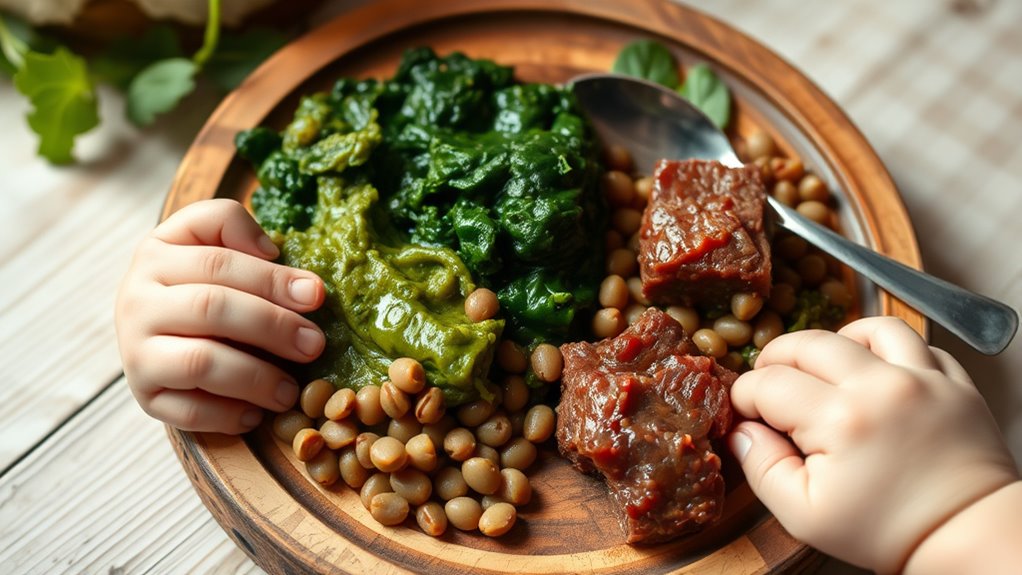
You can boost your infant’s iron intake with natural foods like iron-rich meats and plant-based sources such as beans and spinach. Pair these foods with vitamin C-rich items to improve iron absorption. Understanding these options helps guarantee your baby gets the iron they need to grow healthy and strong. Incorporating a variety of Halloween costumes can make their celebrations even more fun and memorable.
Iron-Rich Meat Options
Including iron-rich meats in your infant’s diet is an effective way to make certain they get natural sources of this essential mineral. These meats are packed with heme iron, which your baby absorbs easily. Consider offering:
- Pureed beef or lamb, providing a powerful boost that supports healthy growth and energy.
- Cooked and pureed chicken or turkey, gentle options that help develop strong muscles and immune defenses.
- Liver, a nutrient-dense choice rich in iron, crucial for brain development and preventing anemia.
- Incorporating nutrient-rich foods helps ensure your infant receives a balanced intake of essential vitamins and minerals necessary for optimal growth.
Plant-Based Iron Sources
Plant-based iron sources can be a valuable part of your infant’s diet, especially when paired with vitamin C-rich foods to enhance absorption. Good options include fortified cereals, pureed beans, lentils, tofu, and dark leafy greens like spinach and kale. These foods provide non-heme iron, which is less easily absorbed than animal sources but still beneficial. To maximize iron intake, introduce a variety of these foods regularly. You can also incorporate mashed peas or sweet potatoes, which contain some iron. Remember, cooking methods like steaming or pureeing make these foods easier for your baby to eat and absorb nutrients from. While plant sources are helpful, they work best when combined with strategies to improve iron absorption and ensure your infant gets enough of this essential mineral. Additionally, understanding best anime movies can be a fun way to engage your child’s imagination and cultural awareness as they grow.
Iron Absorption Enhancers
To help your infant absorb more iron from plant-based foods, pairing them with natural sources of vitamin C can make a significant difference. Vitamin C enhances iron absorption, ensuring your baby gets the most from their meals. You can include:
- Citrus fruits like oranges or mandarins to brighten their plate and boost iron uptake.
- Bell peppers packed with vitamin C that add color and nutrition to their diet.
- Tomatoes or tomato-based sauces that improve iron absorption while making meals flavorful.
- Incorporating cultural dining practices and traditional tableware can make mealtimes more engaging and enjoyable for your baby.
When and How to Introduce Iron-Rich Foods
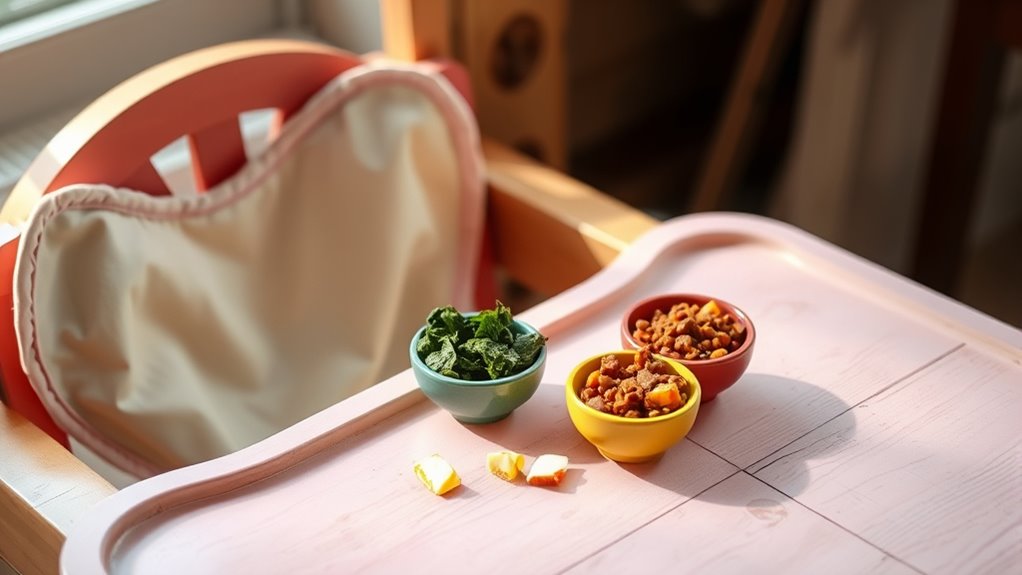
You should start introducing iron-rich foods around 6 months of age, when your baby is ready for solid foods. Choose suitable sources like iron-fortified cereals, pureed meats, or beans, and prepare them to guarantee easy swallowing. Gradually incorporate these foods into your baby’s diet to support healthy iron intake. Using appropriate blending techniques can help ensure the textures are safe and manageable for your infant.
Appropriate Feeding Age
Introducing iron-rich foods at the appropriate age is essential for supporting your infant’s growth and development. Typically, around 6 months, your baby is ready to start exploring solid foods. This is a pivotal time to introduce iron sources that will fuel their rapid development.
Consider these key milestones:
- Observe readiness cues—your baby can sit up with support and shows interest in food.
- Start gradually—offer small amounts of iron-fortified cereals or pureed meats.
- Ensure safety—avoid choking hazards and introduce one new food at a time to monitor reactions.
Timing matters; introducing iron-rich foods too early or too late can impact your baby’s health. Stay attentive and guide their feeding journey thoughtfully.
Suitable Iron Sources
When is the right time to introduce iron-rich foods to your baby? Typically, around 6 months old, your baby is ready to start solid foods, including those high in iron. During this period, iron-rich options like fortified cereals, pureed meats, and beans become important to meet their increasing nutritional needs. You can begin offering small amounts of these foods once your baby shows signs of readiness, such as good head control and the ability to sit with support. Incorporate iron sources into your baby’s diet gradually, ensuring they get enough iron to support healthy growth and development. Remember, iron from both breast milk and formula remains essential during this stage, but introducing suitable iron-rich foods helps prevent deficiencies. Additionally, using aesthetic wall organization solutions can help keep your baby’s eating area tidy and inviting.
Preparing Iron Foods
Once your baby shows signs of readiness for solid foods, usually around 6 months, it’s time to prepare iron-rich options in a way that’s safe and easy for them to eat. Start with small, soft textures to prevent choking and ensure they can swallow comfortably. To make iron-rich foods appealing and manageable, consider these steps:
- Puree iron-fortified cereals or meats into smooth, spoonable textures that suit your baby’s eating ability.
- Introduce soft, cooked, and mashed foods like spinach or lentils, which retain their iron content and are easy to swallow.
- Offer small portions frequently to encourage acceptance and help your baby develop a taste for iron-rich foods.
Types of Iron Supplements Suitable for Infants
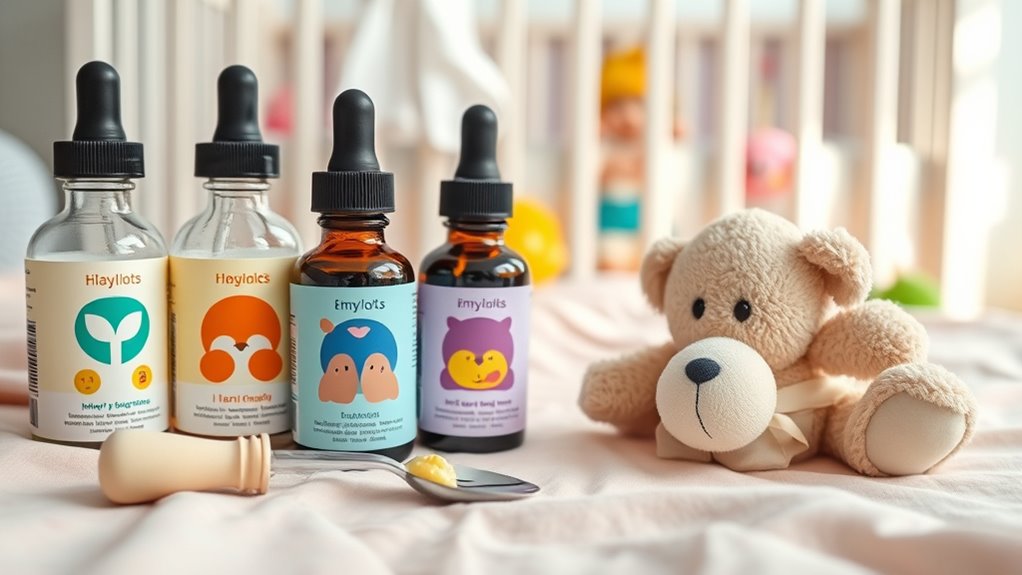
There are several iron supplement options suitable for infants, each designed to meet their unique nutritional needs. Liquid iron drops are the most common choice because they’re easy to administer and absorb quickly. They usually contain ferrous sulfate, which is highly bioavailable. Chewable tablets are available for older infants who can chew, but they’re less common for very young babies. Iron-fortified formulas and cereals are also good options, especially if your baby isn’t getting enough iron from solids. Some supplements combine iron with vitamin C to enhance absorption. Regular use of properly formulated iron supplements can help prevent iron deficiency anemia in infants. Always choose supplements specifically formulated for infants, avoiding adult products. Before giving any supplement, consult your pediatrician to determine the right type and dosage to guarantee safety and effectiveness.
Guidelines for Safe Iron Supplementation
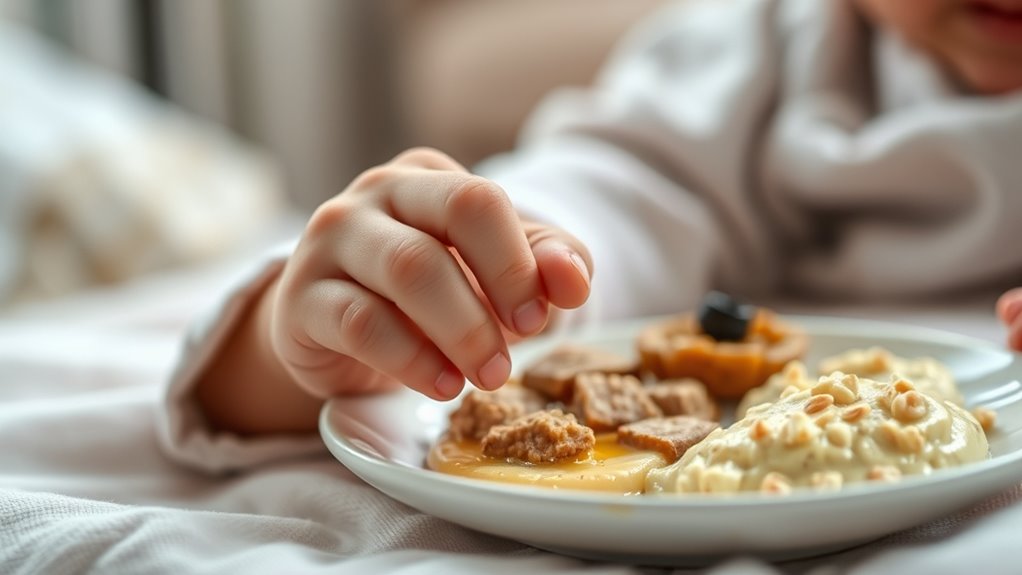
Ensuring safe iron supplementation for your infant requires careful attention to dosage and timing. You want to protect their health without risking excess iron intake. Follow these guidelines to keep your baby safe:
Prioritize proper dosing and timing to keep your infant safe when supplementing with iron.
- Consult your pediatrician before starting supplements to determine the right amount based on your baby’s age and needs.
- Stick to recommended doses—more isn’t better and can cause harm.
- Administer supplements at the right time, usually between meals or as directed, to maximize absorption and minimize discomfort.
Potential Risks of Excess Iron Intake
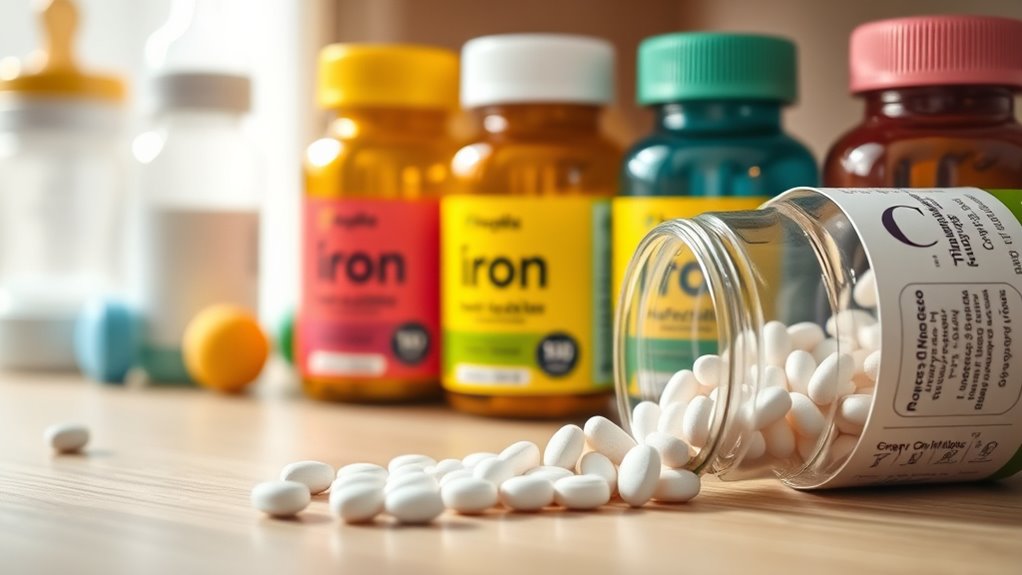
While iron is essential for your infant’s development, taking in too much can lead to health problems. Excess iron can cause constipation, nausea, and stomach upset. In more severe cases, it may damage organs like the liver or heart, especially if high doses are sustained over time. Babies have immature systems that aren’t equipped to handle large amounts of iron, increasing the risk of iron overload. This condition, called hemochromatosis, can lead to iron deposits in tissues, impairing their function. Additionally, too much iron may interfere with the absorption of other essential minerals, such as zinc and manganese. To avoid these risks, it’s vital to follow recommended dosages and not give your infant more iron than advised by healthcare professionals.
Consulting Healthcare Providers About Iron Needs

Consulting healthcare providers about your infant’s iron needs is a vital step in ensuring safe and appropriate supplementation. Your provider can evaluate your baby’s unique health status and dietary intake to determine if iron supplements are necessary.
Consulting a healthcare provider ensures safe, personalized iron supplementation for your infant’s health.
Here’s why talking to a professional matters:
- Avoid unnecessary supplementation, which can lead to health risks.
- Ensure proper dosage tailored to your infant’s age and weight.
- Identify underlying issues that might affect iron absorption or needs.
Frequently Asked Questions
How Can I Tell if My Infant Is Getting Enough Iron?
You can tell if your infant is getting enough iron by monitoring their growth and energy levels. Look for signs like steady weight gain, healthy skin, and alertness. Regular check-ups with your pediatrician include blood tests to confirm iron levels. If your baby shows signs of fatigue, pale skin, or poor feeding, consult your doctor promptly. Ensuring a balanced diet with iron-rich foods or supplements helps keep their iron needs met.
Are There Any Signs of Iron Overdose in Babies?
You might wonder if your baby shows signs of iron overdose. Look out for symptoms like vomiting, diarrhea, constipation, or a metallic taste. Excess iron can also cause lethargy, abdominal pain, or fever. If you notice these, stop supplements and consult your pediatrician immediately. It’s vital to keep iron intake within recommended levels to prevent toxicity and guarantee your little one stays healthy and safe.
Can Breastfed Infants Need Iron Supplements?
They say “better safe than sorry,” and that applies to iron supplements for your baby. Breastfed infants usually get enough iron from breast milk during the first six months. However, if your baby was born prematurely or has a health concern, your pediatrician might recommend an iron supplement. Always follow your doctor’s advice instead of self-prescribing, as excess iron can be harmful.
What Are the Long-Term Effects of Iron Deficiency?
Iron deficiency can cause long-term issues you should know about. It may lead to developmental delays, especially in cognitive and motor skills. You might notice problems with concentration and learning as your child grows. Severe deficiency can cause anemia, making your child feel tired and weak. If left untreated, these effects can persist into adolescence and adulthood. Ensuring adequate iron intake early on helps prevent these lasting health and developmental problems.
Are Vegetarian or Vegan Diets Suitable for Infant Iron Intake?
Think of your infant’s iron intake as a delicate garden, needing just the right nutrients to flourish. Vegetarian and vegan diets can be suitable if you carefully include iron-rich plant foods like lentils, spinach, and fortified cereals. However, plant-based iron is harder to absorb, so pairing these foods with vitamin C sources enhances absorption. Regular check-ups guarantee your little one’s iron levels stay healthy and strong.
Conclusion
Ensuring your infant gets enough iron supports healthy growth and development. For example, if your baby shows signs of fatigue or pale skin, consulting your healthcare provider can help determine if iron deficiency is the cause. By offering iron-rich foods at the right time and following safe supplement guidelines, you can protect your little one’s health. Remember, staying informed and proactive makes all the difference in supporting their bright future.
